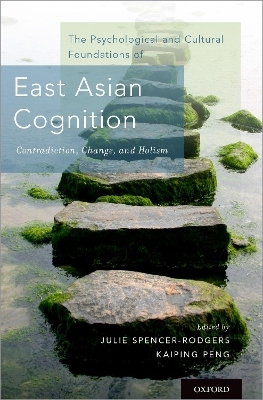
The Psychological and Cultural Foundations of East Asian Cognition
Oxford University Press Inc (Verlag)
978-0-19-934854-1 (ISBN)
The unprecedented economic growth in many East Asian societies in the few past decades have placed the region center stage, and increasing globalization has made East-West cultural understanding of even greater importance today. The Psychological and Cultural Foundations of East Asian Cognition is one of the most comprehensive volumes on East Asian cognition and thinking styles to date, and is one of the first to bring together a large body of empirical research on naïve dialecticism and analytic/holistic thinking theories stemming from Richard Nisbett's highly influential The Geography of Thought.
Edited by Julie Spencer-Rodgers and Kaiping Peng, The Psychological and Cultural Foundations of East Asian Cognition expertly examines the psychological, philosophical, and cultural underpinnings and consequences of these thinking theories for human thought, emotion, and behavior. In the past couple of decades, research on this topic has flourished, and East-West cultural differences have been documented in almost all aspects of the human condition, from the manner in which people reason and make decisions, conceptualize themselves and those around them, to how they cope with stress and mental illness, and interact with others, including romantic partners and social groups.
Contributions to this volume cover such fascinating and diverse topics as cultural neuroscience and the brain, lifespan development, attitudes and group perception, romantic relationships, the adoption of foreign mindsets and perspectives, creativity, emotion, the self-concept, racial and ethnic identity, psychopathology, and coping processes and wellbeing. Further, the research featured within this volume has practical implications for business and organizational management, international relations and politics, education, and clinical and counseling psychology, and may be of particular interest to business professionals, managers in government and non-profit sectors, as well as educators and clinicians working with East Asians and Americans of East Asian descent.
Julie Spencer-Rodgers graduated from UC Berkeley and is an Associate Professor at the Dept. of Psychology at California Polytechnic State University, San Luis Obispo. She was awarded the Early Career Award from the International Academy of Intercultural Research and the Otto Klineberg Intercultural and International Relations Award from the Society for the Psychological Study of Social Issues, of which she is a Fellow. Kaiping Peng graduated from the University of Michigan, and is the founding Chair of the Psychology Department at Tsinghua University, and an emeritus professor of the University of California, Berkeley. He is one of the most highly cited social psychologists (APS Observer) and is the author of over 140 articles and several monographs.
Chapter 1 - What is Dialectical Thinking? Conceptualization and Measurement
Julie Spencer-Rodgers, Elise Anderson, Christine Ma-Kellams, Carol Wang, Kaiping Peng
Chapter 2 - The Epistemology of Yin-Yang Balancing as the Root of Chinese Cultural Traditions: The Indigenous Features and Geocentric Implications
Peter Ping Li
Chapter 3 - Culture and Lay Theories of Change
Ning Zhang, Li-Jun Ji, and Tieyuan Guo
Chapter 4 - Analytic versus Holistic Cognition: Constructs and Measurement
Minkyung Koo, Jong An Choi, and Incheol Choi
Chapter 5 - Dialecticism Across the Lifespan: Towards a Deeper Understanding of the Ontogenetic and Cultural Factors Influencing Dialectical Thinking and Emotional Experience
Igor Grossman
Chapter 6 - The Cultural Neuroscience of Holistic Thinking
Bobby K. Cheon, Ronxiang Tang, Joan Y. Chiao, and Yi-Yuan Tang
Chapter 7 - Judging the World Dialectically vs. Non-Dialectically: Cultural Variations in Online Decision-Making Processes
Takahiko Masuda, Liman Man Wai Li, and Matthew J. Russell
Chapter 8 - Contextualization of Mental Representations and Evaluative Responses: A Theory-Based Analysis of Cultural Differences
Yang Ye and Bertram Gawronski
Chapter 9 - Dialectical Thinking and Creativity from Many Perspectives: Contradiction and Tension
Susannah B.F. Paletz, Kyle Bogue, Ella Miron-Spektor, and Julie Spencer-Rodgers
Chapter 10 - Dialectical Thinking and its Influence in the World: A New Perspective on East Asians' Control Orientations
Joonha Park, Susumu Yamaguchi, Takafumi Sawaumi, and Hiroaki Morio
Chapter 11 - Entitativity Perceptions of Individuals and Groups Across Cultures
Saori Tsukamoto, Yoshihisa Kashima, Nick Haslam, Elise Holland, and Minoru Karasawa
Chapter 12 - Dialecticism in Close Relationships and Marriage
Susan E. Cross and Ben C.P. Lam
Chapter 13 - The Yin and Yang of Attitudes and Related Constructs: Dialectical and Holistic Influences
Christine Ma-Kellams, Julie Spencer-Rodgers, and Kaiping Peng
Chapter 14 - The Dialectical Self: The Internal Consistency, Cross-Situational Consistency, and Temporal Stability of Self-Conception
Sylvia Xiaohua Chen, Julie Spencer-Rodgers, and Kaiping Peng
Chapter 15 - Dialecticism and the Future Self in Cultural Contexts: Relations to Well-Being
Qi Wang, Yubo Hou, and Tracy Gould
Chapter 16 - Contextual and Cultural Factors Influencing Malleable Racial Identity
Julie A. Garcia, Diana T. Sanchez, and Margaret Shih
Chapter 17 - When in Rome Think Like a Roman: Empirical Evidence and Implications of Temporarily Adopting Dialectical Thinking
Ashley M. Votruba and Virginia S.Y. Kwan
Chapter 18 - Dialectical Emotions
Brooke Wilken and Yuri Miyamoto
Chapter 19 - Dialecticism and Mental Health: Toward a Yin-Yang Vision of Well-Being
Y. Joel Wong and Tao Liu
Chapter 20 - The Yin/Yang of Stress: The Link Between Dialectical Thinking and Coping Processes
Hi-Po Bobo Lau and Cecilia Cheng
Chapter 21 - Dialectical Thinking and Attitudes Toward Action/Inaction Beyond East Asia
Ethan Zell, Rong Su, and Dolores Albarracín
| Erscheinungsdatum | 15.03.2018 |
|---|---|
| Verlagsort | New York |
| Sprache | englisch |
| Maße | 157 x 236 mm |
| Gewicht | 1089 g |
| Themenwelt | Geisteswissenschaften ► Psychologie ► Allgemeine Psychologie |
| Geisteswissenschaften ► Psychologie ► Verhaltenstherapie | |
| Sozialwissenschaften ► Ethnologie | |
| Sozialwissenschaften ► Soziologie ► Allgemeines / Lexika | |
| ISBN-10 | 0-19-934854-5 / 0199348545 |
| ISBN-13 | 978-0-19-934854-1 / 9780199348541 |
| Zustand | Neuware |
| Informationen gemäß Produktsicherheitsverordnung (GPSR) | |
| Haben Sie eine Frage zum Produkt? |
aus dem Bereich


